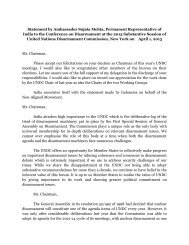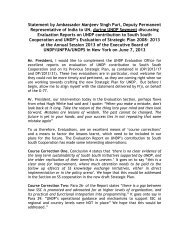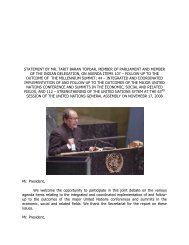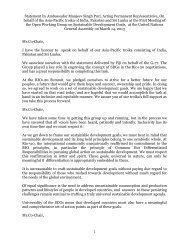STATE OF THE WORLD'S CITIES 2012/2013 Prosperity
STATE OF THE WORLD'S CITIES 2012/2013 Prosperity
STATE OF THE WORLD'S CITIES 2012/2013 Prosperity
Create successful ePaper yourself
Turn your PDF publications into a flip-book with our unique Google optimized e-Paper software.
Urban planning can contribute to the prosperity of cities<br />
in various ways.<br />
While there is growing recognition of the benefits,<br />
positive contribution and potential opportunities associated<br />
with cities, urban planners and policymakers in some<br />
developing countries are still ambivalent about the<br />
importance of urbanization and some cases, show aversion<br />
to the urbanization process. This should not be the case,<br />
because cities generate the bulk of GDP; they are the<br />
engines of growth and centres of innovation.<br />
There at least two ways to achieve this. The first is<br />
to nurture the growth of high-productivity activities –<br />
particularly manufacturing and services, which benefit from<br />
agglomeration economies. The second entails managing<br />
the negative externalities associated with the economic<br />
growth and success of cities – congestion, inequality, crime<br />
and violence, and soaring cost of land and housing, among<br />
others. 5 Neglecting cities even in countries with low levels<br />
of urbanization can impose significant costs. 6<br />
The positive nature of urbanization can be beneficial<br />
to the poor if the common deprivations that affect<br />
their daily existence are adequately addressed. Such<br />
deprivations include limited access to income and<br />
Figure 3.1.1<br />
Factors underlying urban prosperity<br />
per cent of respondents<br />
35<br />
30<br />
25<br />
20<br />
15<br />
10<br />
5<br />
0<br />
Ef�cient urban planning &<br />
management<br />
Policies that promote participation<br />
of civil society<br />
93<br />
From Comparative Advantage to Urban <strong>Prosperity</strong><br />
employment; inadequate<br />
living conditions; poor<br />
infrastructure and<br />
services; risks associated<br />
with living in slums;<br />
spatial issues which inhibit<br />
mobility and transport;<br />
and inequality associated<br />
with exclusion.<br />
Effective urban<br />
planning, together with<br />
Access to basic amenities including public transport<br />
Decentralization policies &<br />
appropriate institutions<br />
System that creates equal<br />
opportunities for all<br />
Elected local of�cials Sound business environment &<br />
entrepreneurial culture<br />
Africa Asia LAC Arab States All regions<br />
Source: UN-Habitat City Monitoring Policy Survey, 2011<br />
POLICy<br />
Managing urbanization is essential to nurturing the<br />
prosperity of cities. Cities that want to grow and<br />
be prosperous in all five dimensions must make urbanization<br />
work well.<br />
POLICy<br />
When urbanization is planned and well-managed, and<br />
distributive mechanisms of prosperity are put in place,<br />
it can contribute to poverty reduction.<br />
POLICy<br />
Another way<br />
urban planning<br />
can bring about more<br />
liveable cities consists in<br />
tackling slums and informal<br />
settlements, as no city can<br />
claim to be prosperous<br />
when large segments of<br />
the population live in slum<br />
conditions.















![1 statement by dr.[mrs] kakoli ghosh dastidar - Member States Portal](https://img.yumpu.com/27526598/1/190x245/1-statement-by-drmrs-kakoli-ghosh-dastidar-member-states-portal.jpg?quality=85)

